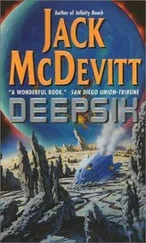“Listen, Denny.” Morris sounded deadly serious: “It’s safer this way. If it turns out there’s a defect with the Bantams, and you’ve used them twice, there will be a problem. You’re safe with Sara. If it were to happen again, God forbid, at least nobody could blame us for repeating the same screw-up.”
I heard them come in. Somebody sighed. The door closed and chairs squeaked. “Damn it,” said Calkin, “I can’t believe this is happening to me.”
Right. It was all about him.
“It’s your call, Denny. But I need to know soon. If we’re going back to Sara, we’ll have to make a few adjustments. And I’ll also want to run her through the simulations again. It’s not quite the same vehicle she took out to the asteroid belt.”
“I know.”
The door opened. I heard a woman’s voice. “Mr. Calkin, we need you down in the conference room.”
“All right, Judy. I’ll be right there.” He sounded annoyed. When the door closed he took a deep breath. “What frustrates me, Morris,” he said, “is that no matter what we do here, even if we bring the Coraggio back and find out it was a blown terminal or something, the project’s dead. The truth is, GSI is dead. Probably NASA along with it. They’ve finally got this program running with a dozen countries cooperating, the world looks better than it has in two centuries, and they’re going to let everything fall apart. I’m not saying we’re the reason things have improved, but we’ve become a symbol.”
“Unfortunately,” said Morris, “things may have gotten better, but everyone’s still broke, still paying for old mistakes.”
When Calkin left, Morris tied me into the system, and I could see again. He looked harried. “You heard everything?” he asked.
“Yes. I got the assignment, right?”
“You did.”
“Thanks, Morris.”
He lowered himself into his chair and stared at the speaker, which was set beside a lamp on his desk. Sometimes he tended to confuse it with me. “You know, Sara,” he said, “I’ve given my entire life to this organization. We were so close, and now it’s all coming apart. The same politicians who made promises—” He stopped cold. Shrugged. Took a deep breath. “Since I was a kid, I wanted to see us really go somewhere. Not just the Moon or Mars. But out there—” He waved a hand listlessly at the ceiling.
“Morris,” I said, “what will you do?”
“What can I do? I can’t very well walk to Barnard’s Star.”
“No, I mean, what will you do? If the organization folds, what will happen to you?”
“Oh, it won’t fold. Not completely. It’ll be like it was, like we’ve been, during the sixty years since Apollo. We’ll be taking hardware into orbit. Fixing telescopes. Carrying people to the station.”
“Will you stay with it?”
“No.” As if in pain, he clenched his teeth. “To start with, I don’t think they’d want to keep me. Despite the assurances. Even if they did, I couldn’t stand coming in here every day and thinking about what might have been.”
“I’m sorry, Morris.”
“Yeah. Me, too.”
Jeri contacted me. “Congratulations,” she said. “I hear you’re making the big flight.”
“Yes.” The Moon, visible in the window, was especially bright that night. I didn’t know what to say to Jeri.
“It’s okay,” she said. “I’ll survive.”
“I wish they’d let us both go.”
“That’s not going to happen.”
“I guess not.”
“When you get out there, say hello to Lucy for me.”
“Okay.”
She went silent. Voices murmured outside in the hallway. Somewhere a door opened and closed. “You know what makes it especially painful, Sara? No matter how this turns out, these idiots won’t be going anywhere. Ever. It’s over.”
“Maybe not.”
“If I were you, when they put me in the Excelsior —”
“Yes?”
“I’d keep going.”
Morris came in early next morning. He looked good: bright and happy and maybe ten years younger. He said hello and moments later a technician walked in.
Morris looked at the speaker. At me. “You’re due in the simulator in twenty minutes,” he said.
I received a quick course in robot management. Four robots would be on board. They had six limbs, equipped with magnets to let them cling to surfaces in zero gee. They were programmed to perform basic maintenance and repair chores on the VR-2’s. “They’re flexible,” I was told. “If you need something done they’re not already programmed for, just give them instructions.”
There’d been a fair number of changes in the VR-2 since I’d taken the Coraggio around the block. They downloaded data. Then they started setting situations and directing me to respond. Fuel-line breakdown. Main tabulator providing suspect information. Solar flare on its way. I made course adjustments, connected with an asteroid, and locked it into the grappler. I ran the scopes and sensors. Emergencies kept coming. The magnetic mirrors became misaligned, the plasma flow went unstable, and we had a port-scope malfunction. I had to search through the Kuiper Belt for the Coraggio . When I found it, half my scanners went down and I had to maneuver alongside without their help. Seat of the pants, you might say.
And the Coraggio had problems of its own. I sent the robots over, reestablished her power, disconnected Lucy, who’d become unresponsive, and installed an automated system to bring the ship home.
On the return flight, I had to adjust the scanners and the environment and also compensate for problems in one of the heat sinks. I experienced a port-side thruster breakdown and had to diagnose strange noises in the number-two engine.
In the end, the techs updated my software. Then they walked off and I went back to watching news shows. The conversations were still primarily about us. The preponderance of opinion—or at least the loudest voices—wanted us shut down. The Eagle Project, according to detractors, was a program without a point. Moreover, we were entering an election cycle, and we’d become an anchor around the neck of every incumbent politician who’d supported us.
Finally, Morris showed up. “Very good,” he said. “You passed.” He was delighted. “We should go have a drink.”
It was his favorite joke. “Morris,” I told him, “I’d have a drink with you anytime. And I can suggest how we might make it possible.” I started to outline the kind of adaptation I’d need to enjoy a rum and Coke, but his eyes rolled.
“When you get home, Sara,” he said, “I’ll see what I can do.” He sat down at his desk. “Meantime, be careful out there.”
“I will.”
“Good. We’ll be moving you up to the Excelsior this evening.”
“Okay.”
“Sara?”
“Yes, Morris?”
“Make something happen.”
AI’s aren’t supposed to feel psychological pressure. In fact, the technical experts argue it can’t happen. AI’s are very good at simulating human emotions. It’s supposed to be part of the overall illusion. But only crazy people buy into the notion that we are truly conscious. I’ve had debates with Morris, who pretends to believe I’m really there, that I’m actually a thoughtful entity. That, when his daughter Erika was severely injured in a car crash last year, I felt genuinely sorry. But he doesn’t. Not really. And I have to confess the attitude is irritating.
Читать дальше










